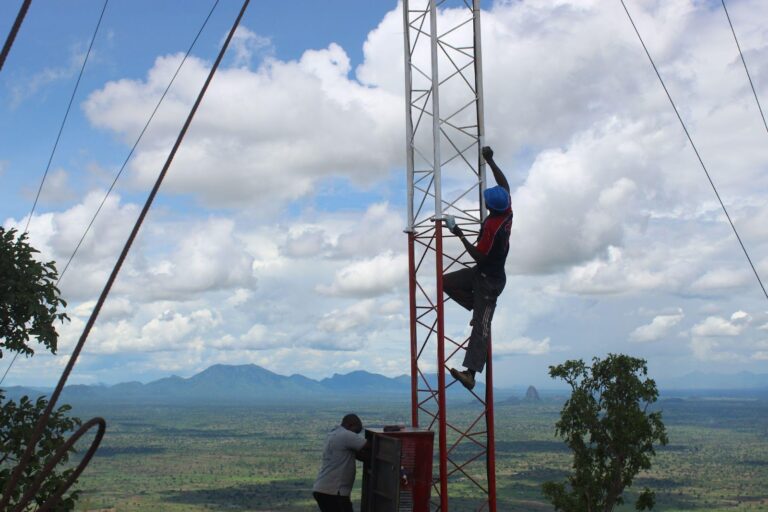Extension of Network in Agago District with BOSCO
Extending the already existing ICT centers in the Agago District will allow more people to become connected to the internet.

Project status: Closed
Country: Uganda
Partner: Battery Operated System for Community Outreach (BOSCO)
Impact goal: 2500-3000 students and 7000 residents.
About the project
This project aims to extend the already existing ICT centers in the Agago District, which will allow more people to become connected to the internet. One strategic tower will be erected on a 500 meter high hill. It will be equipped with network infrastructure to provide wireless internet connectivity via connection to the BOSCO Uganda community network. This provides equitable access to the four community centers who are currently isolated from the rest of the world due to insufficient or zero signal from other networks.
We would recommend watching this video BOSCO Uganda made about the project!
Results
Assessments were done at the 4 ICT Centers i.e Gwokke keni Community ICT Center in Patongo, Superstar ICT Centre in Lukole, Gwok ma inongo farmers Network in Paimol and Lira Palwo Primary School.
During this assessment, we found out that one of the centers (Lira Palwo Primary School) had most of their equipment stolen. Additionally, the room where the ICT Centre was installed was recalled by the district. Several attempts were made to meet the management team of this center but with no result. BOSCO Uganda therefore decided to move the center to another youth group that had been seeking a partnership with BOSCO Uganda, called Divine Mercy Youth ICT Centre under Patongo Parish (Church), where prior assessment was conducted and active youth with need for ICT support was identified.
One strategic tower of 18 meters high was erected on a 500-meter Kalongo hill in Agago district. It was equipped with a network that is providing point to point wireless internet connectivity to the four community Centers that were isolated from the rest of the world. The facilities in three of the ICT centers needed upgrading, which included purchase and installation of five new laptops, one solar battery of 200AH, a charge controller, an inverter and internet connectivity at each of the centers.
The community members at the different sites were tasked to democratically and gender sensitively come up with the leadership structures that would govern the ICT Center’s smooth running and operation. At each of the ICT Centres 11 people were voted from each of the 4 centers to equitably manage the daily operation. The structures formed were very inclusive and it derived positions like chairperson, vice chairperson, treasurer, secretary, publicity and members. These were voted for by the community members and presented to BOSCO Uganda for training.
After the formation of the site management committees (SMCs) at all the four centers, Leadership and management training was carried out to build the capacity of the site management committees to sustainably run the ICT Centres with great leadership and management skills.
The leadership and management training were in areas of site management composition, risk management, documentation and record keeping, conflict management, sustainability tips, monitoring and evaluation. Twelve people were trained per center by the BOSCO Uganda team on computer literacy. The topics included introductions to computers, keyboard usage, Microsoft office word, excel, PowerPoint and Publisher, introduction to the internet, online information gathering, social media marketing, basic computer and network maintenance and the intranet where they can have access to Kolibri which contains educational content. The training was conducted mainly in the local language (Acholi).
The direct beneficiaries include the people trained by BOSCO Uganda both in leadership and management, digital literacy and computer maintenance training as Trainers of Trainees (ToTs). Further beneficiaries include people trained by the ToTs on the ground at the centers, daily users at the center and internet subscribers. Internet subscribers used the internet for different purposes like accessing educational content through Kolibri, researching, marketing their products and connecting with potential buyers like Gwok ma inongo farmers Network. The indirect beneficiaries are the people impacted by the direct beneficiaries. The total direct beneficiaries of the project were 4,630 (2,568 male and 2062 female) community members.
Unforeseen challenges
The exchange rate used at the time of application drastically changed causing discrepancies and readjustment of the budget. The plan was to buy better computers for the community. Some sections of the tower were moved from another location further away than the one planned. The exchange rate also affected the height of the tower originally planned. However, what was constructed is meeting the purpose for which it was constructed.
About the partner
Battery Operated System for Community Outreach (BOSCO) is an NPO in northern Uganda. The organization was formed in 2007 as an intervention to end the isolation of people in the Internally Displaced People’s camps of northern Uganda. The organization realizes its vision of ‘open and peaceful rural communities ready to face the challenges and opportunities of the globalized world in the 21st Century’ by providing innovative ICT solutions that foster socio-economic development and peace-building in the rural communities of northern Uganda.
Visit their website here to learn more about them.